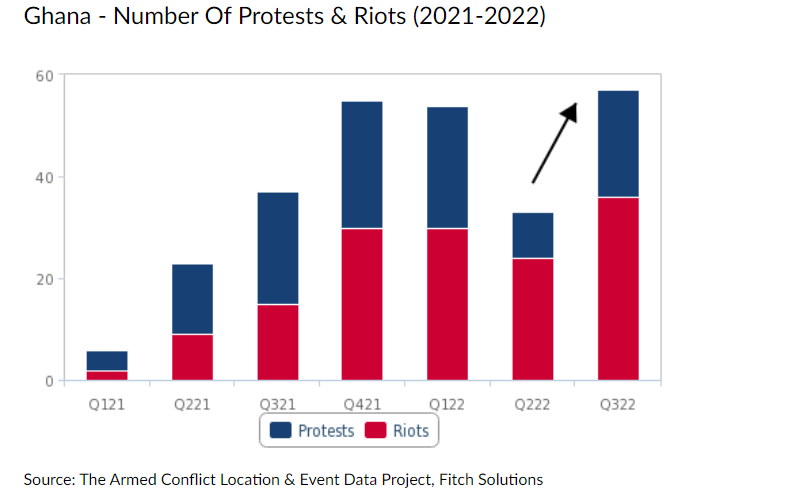Fitch Solutions has maintained that Ghana will reach a staff-level agreement with the International Monetary Fund (IMF) by the first quarter of 2023.
This will mean that the country could secure a programme from the Fund by the end of quarter 1, 2023 or the second quarter of 2023.
Some economists and experts were anticipating that the country could reach a staff-level agreement with the Fund before the end of 2022 to pave way for a programme by the first quarter of 2023.
But in its latest paper on “Division within Ghana's Ruling Party to Weigh on Political Stability”, the international research firm also said should the Finance Minister, Ken Ofori-Atta, be replaced, negotiations with the IMF would likely remain largely unaffected.
“While Ofori-Atta remained opposed to an IMF bailout – we believe that he would take a more accommodative approach towards negotiations with the Fund. As such, we believe that a change of finance minister would most likely not impact the timeline of IMF negations and we would retain our view that a staff-level agreement will be reached in Q123 [quarter 1, 2023]”, it explained.
Government to face additional pressure from frequent protests
Furthermore, it said the government will face additional pressure from more frequent protests and industrial action.
“Worsening living standards amid rising consumer prices – inflation reached 40.4% year-on-year in October 2022, the highest reading since 2001 – and tighter monetary conditions have led to a 72.7% quarter-on-quarter increase in protests and riots across in quarter 3 2022. The country has also seen large industrial action in recent months, including a three-day retail strike in Accra in October [2022]".

Inflation to remain elevated, weighing on living standards
Fitch Solutions also expects inflation to remain elevated in the months ahead.
“Given that inflation is primarily driven by currency weakness, we expect price growth to remain elevated in the months ahead. Indeed, significant capital and financial account outflows caused by weakening investor sentiment will continue to weigh on the currency”.
“Our view is further informed by the fact that previous periods of significant exchange rate weakness in Ghana all lasted roughly 12-14 months, suggesting that the cedi will continue to depreciate into quarter 1, 2023 (the current sell-off started in January 2022). This will keep inflation high, weighing on living standards and eroding support for the government”.
Latest Stories
-
Shaggy credits God for ‘It Wasn’t Me’ as he reflects on career, culture and service
7 minutes -
California doctor to plead guilty to supplying Matthew Perry with ketamine
33 minutes -
Gov’t appeals for logistical support to evacuate Ghanaians amid Israel-Iran conflict
47 minutes -
Health Ministry inaugurates committee to boost pandemic preparedness
53 minutes -
Government pledges more incentives for Ghana’s auto assembly sector
1 hour -
National Service allowances to be increased in next service year – Director-General assures
1 hour -
NPP constitutes 9-member committee to spearhead National Delegates Conference
2 hours -
NPP slams police over delay in Ablekuma North collation, accuses NDC of obstruction
2 hours -
Gov’t must invest in local industry and patient capital to sustain economic gains – Coconut Grove Regency CEO
2 hours -
I’m not pro-state, my judgement is guided by law – Justice Bartels-Kodwo
2 hours -
NPP to elect 2028 flagbearer on January 31, 2026
2 hours -
Ahwoi family mourns their sister, Ama Adoma Bartels-Kodwo
2 hours -
Coconut Grove Hotels slash rates by up to 30% in response to strengthening Cedi, falling inflation
2 hours -
It’s time to strongly advocate for non-custodial sentences – Justice Bartels-Kodwo
3 hours -
SLTF unlocks access for under-18s on No-Fees-Stress registration portal
3 hours

